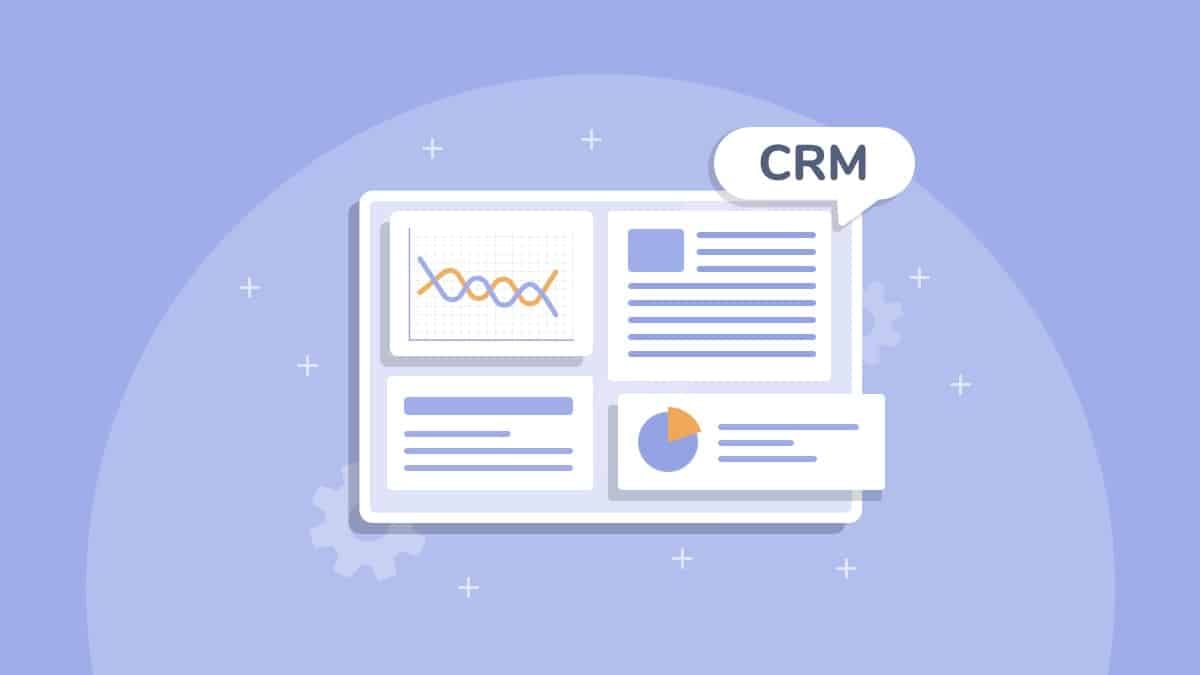Top 7 CRMs for Small and Medium Businesses
- Custom Solutions
- Salesforce

A CRM is an essential tool for every business in today's digital world. However, not all CRMs are created equally. Whether you're running a large enterprise or have a small startup with limited funds for technology and marketing investments, finding the perfect CRM can be difficult. They vary in their user interface and functionalities. However, the most important thing is that they should be easy to use while being highly functional.
This article will list the top 7 CRMs based on user experience, design, and richness of features. You can also check out this list of alternatives to the top 7 best CRMs that may fit your needs better.
1. Zoho CRM
Zoho, Inc. is a software company that offers a wide range of applications and services for small businesses, startups, and enterprises. The company offers more than 30 products in business productivity, communications, collaboration, salesforce marketing cloud, sales, finance, and administration through the web or mobile devices. The software integrates with other Zoho products. It also comes with built-in security and backup solutions to protect data and automate the backup process.
Some of its best features include:
- Personalized inbox – users can create and manage individual inboxes for each contact they communicate with. This inbox can contain mail, orders, and more.
- Customizable dashboards – users have predefined dashboards to keep track of opportunities, leads, sales, and other reports in one place. They can also build and share custom dashboards for their entire team.
- Advanced reporting – users can create and customize their reports based on different filters. You can export reports and dashboard data in different formats such as XLS, PDF, and CSV for offline use.
- Salesforce integrations – users can integrate their Zoho CRM data with third-party solutions, including Google Analytics, Google Ads, Salesforce, etc.
- Import from/export to Excel – Users can export their data in XLS format for offline use. They can also import data from an existing Excel file into Zoho CRM by uploading the file to their dashboard.
- Data-driven workflows – users can use the built-in integrations to automate processes and send out automated emails.
Campaigns – users can create and manage email campaigns such as autoresponders and welcome series. They can also develop automated tasks such as landing pages, surveys, form builders, etc.
2. Agile CRM
Agile CRM is a free CRM that comes with more than 100 integrations for all major sales and marketing solutions. It uses AWeber for email marketing, Act! for contacts and customer data, and Streak for conversion tracking. It integrates with Zapier to create automated tasks such as social media posts, website updates, forms, and surveys. In addition, it uses Invoicing and Billing features to manage payments from customers. Features of Agile CRM
- Google Analytics integration – users can track basic and advanced Facebook, Twitter, Instagram, YouTube, and Pinterest profiles.
- Quick answer for questions – users can access expert checklists based on their needs. The Agile CRM team has developed these checklists.
- Slim Reports – users can create custom reports to keep track of sales, engagement, and social media ROI. They can also view reports from different perspectives to identify where they are falling behind.
- Dashboards – users can create and customize their dashboards based on the metrics that matter to them. They can also share dashboard widgets with their teams to get everyone on the same page.
- Gmail plugin – users can access their contacts and leads directly from their Gmail inbox. They can also use Gmail filters to share any emails they receive into Agile CRM.
3. SalesForce Essentials
Salesforce Essentials is a simple CRM solution that comes with all the core features of Salesforce at no cost. It also includes up to 30 users and 25 GB of storage. It provides social, mobile, and email marketing capabilities and the traditional sales and customer service functions. Some features include:
- Social media management – users can track their social media campaigns and analyze their ROI for each post or tweet. They can also manage their social media profiles on Twitter, Facebook, Instagram, and YouTube.
- Email marketing – users can create and send customizable email campaigns such as autoresponders and welcome series. They can also develop automated tasks such as landing pages, surveys, form builders, etc.
- Import contacts from other systems – users can sync their contacts with Salesforce using the CSV export format in different CRMs such as SugarCRM, Highrise, and Microsoft Dynamics CRM. They can also sync their leads from websites.
- Salesforce Сommerce Сloud – users can track the entire sales cycle for each contact from start to finish. They can see when the lead was created when assigned to a salesperson and every activity since this point.
- Reporting – users can generate unlimited reports using Salesforce charts and dashboards. They can also create custom reports based on the information that matters most to them.
4. HubSpot CRM
HubSpot CRM is a cloud-based CRM with real-time capabilities and allows users to access their data from any device. It also integrates with other social media platforms such as Facebook and Twitter. In addition, users can use it in a stand-alone mode to manage all of their open communication channels. Some of its best features include:
- Curated content – users can curate their contacts and leads into HubSpot CRM. They can also use HubSpot InMail, allowing users to send out personalized emails easily.
- Concept management – users can organize their contacts by persona and use the marketing concept management capabilities to develop their overall marketing strategy with relevant content for each channel.
- Task management – users can create tasks with due and follow-up dates to keep track of their campaigns. They can also create task lists to keep track of their duplicate tasks.
- Lead scoring – the CRM solution comes with lead scoring capabilities. It tracks leads from the website, email, and social media channels to help users prioritize their contacts via the lead score tool.
5. BenchmarkONE
BenchmarkONE is a CRM system built to empower companies to grow through a data-driven marketing strategy. It allows users to create, customize and manage dynamic campaigns. The solution also comes with marketing automation capabilities that automate tasks such as email campaigns and social media posts to increase engagement and ROI. Features.
- Mobile Optimization – users can access their contact data through their mobile device. They can also access leads, tasks, and reports from any device.
- Multi-channel Campaigns – users can create campaigns that target different channels, including social media, email, phone, and online advertisements. They can also monitor the performance of these campaigns using KPIs for each channel.
- Email Marketing – users can create personalized autoresponders and welcome series to grow their database with emails that are relevant to them specifically. They can also use the email campaign manager to create social media posts, website updates, forms, and surveys.
- Analytics and reporting – users can gain insights into their leads, contacts, and conversion rates to help them gauge their ROI for each marketing campaign. They can also compare the performance of each channel to identify their best-performing channels for future improvements.
- Task management – users can assign tasks to different team members based on role or action items. They can also add due dates, attachments, and comments for each task.
- Lead scoring – users can track the progress of their leads using the lead scoring model. It allows them to segment the leads into groups based on the score that they have achieved. It allows them to prioritize their leads based on which contacts will bring the highest investment return.
6. Drip
Drip is an email marketing platform that allows users to create, handle and send out email campaigns. It also comes with marketing automation capabilities that allow users to segment their audience based on specific criteria. The platform comes with a drag-and-drop editor for designing the user interaction and content. It also has mobile capabilities for using it on any device to manage the campaigns from anywhere. Some of its best features include:
- Email Campaigns – users can send out email campaigns you can target to specific groups based on the topic and content. They can also set up A/B tests to choose the best subject line for their emails.
- Segmentation – users can segment their contacts based on criteria such as particular interests, locations, industry, etc. It allows them to create a more targeted marketing campaign to increase engagement.
- Content Creation – users can use the drag-and-drop editor to design the content they want their recipients to see. They can also use various templates to create different types of content, such as landing pages, thank you pages, and more.
- Google Analytics integration – users can create and send emails via third-party analytics tools such as Mixpanel, Piwik, Google Analytics, and Adobe Omniture.
7. Keap (formerly known as InfusionSoft)
Keap is a lead management system that uses a hub and speaks approach to track the different communication forms. It allows users to track their leads from data sources such as social media, email, websites, and more. In addition, it allows users to create different types of campaigns such as calls-to-actions, webinars, and more. In addition, it has segmentation capabilities that allow users to identify their prospect's needs using the tools available for each channel. Some of its best features include:
- Lead generation – the system allows users to collect leads from different channels such as social media, email, websites, and more. It also allows them to create their data sources. It allows them to track how many leads are generated through each channel and their engagement levels.
- Lead management – users can manage all of their leads using the hub and spoke approach. They can also keep track of the contact information of their prospects, such as emails, phone numbers, URLs, or any other type of contact information.
- Сampaign management – users can create different calls-to-actions for their prospects based on their needs. They can also create webinars and other forms of content to educate them about their products and services.
- Mobile capabilities – users can access all features through mobile devices anywhere. They can also see which leads are scheduled to follow up with them on certain days and which ones are attending the webinars or calling into the call center.
Here at Kapsys, we have a range of technology services suitable for SMBs and enterprises, including custom software development, IT consulting, SalesForce integrations within business IT infrastructure. Some of the reasons you may want to speak with Kapsys include fast response times to your IT needs, affordability, and reliability. Kapsys has everything you need to keep your computer running smoothly and its hardware in good shape.


